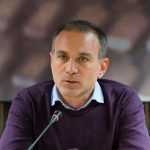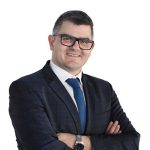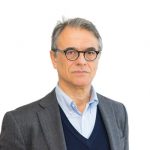The Institute of Global Affairs (IGA) is a center of scholarship in public and international affairs, established at the American College of Greece in 2008. The Institute regularly hosts round tables, presentations, panel discussions, conferences and/or workshops. Through the participation of high-level academics, politicians, economists, diplomats, policy-makers and other opinion leaders, the Institute aims at enhancing the understanding of contemporary regional and international complex issues as well as promoting a sincere and open dialogue.
The Institute focuses on the study of six thematic areas: (i) European Affairs, (ii) Middle East and North Africa, (iii) East-West and Eurasian Relations, (iv) Energy Security and International Markets, (v) The Emerging New Strategic and Economic World Order, and (vi) The Rise of Populism and the challenges to Democracy. The study of these areas is policy-oriented and complemented by an identification and analysis of regional complexities and global developments. The relations between states, international organizations, intergovernmental agencies, NGOs and individual actors, are a key component of IGA’s objects of study.
The Institute is managed by a Director and operates under the coordination of the ACG Office of Public Affairs. An Academic Advisory Board, comprising Deree faculty members with relevant expertise, works closely with the Institute’s Director in setting its strategy and planning its activities. The Institute participates in the academic life of The American College of Greece by organizing events in collaboration with individual ACG departments as well as with Student Societies or Clubs. Events are held at the Deree campus in Aghia Paraskevi. They address mainly students, faculty and staff, but are also frequently open to the public. Serving the needs of the students of the “International Relations & European Affairs” major that was launched in September 2018 is of primary importance.
The Academic Board
 BA in Political Science and History, University of La Verne; MA in Global Governance, University of Reading; PhD in Russian Foreign Policy, University of Reading
BA in Political Science and History, University of La Verne; MA in Global Governance, University of Reading; PhD in Russian Foreign Policy, University of Reading
Upon completing his PhD, Dr. Filis was elected Senior Associate Member at St Antony’s College, Oxford University (2007-2009), and completed a research fellowship at Southeast European Studies at Oxford (SEESOX), Oxford University (2008-2010). He heads the Russia, Eurasia and Southeast Europe Centre at Panteion University’s Institute of International Relations, of which he was formerly Executive Director (2019-2021) and Director of Research Programs (2012-2019). He is also board member of the Advisory Board at the same institute. He lectures at the Hellenic Naval Staff and Command College (since 2012), at the Hellenic National Defense College (since 2016), at the Hellenic War College (since 2020) and at the National Security School (since 2019). He is currently a member of the Board of Directors of Piraeus Asset Management; the Greek-Turkish Forum; the Institute of Energy for South-East Europe; and the Delphi Economic Forum. He is also President of the Foundation of Thracian Art and Tradition and Director of the International Olympic Truce Centre and a member of the Hellenic Olympic Committee; energy and geoeconomics advisor to the Hellenic Entrepreneurs Association and Advisory Board member of DiaNEOsis Research and Policy Institute.
Dr. Filis is the Director of the ACG Institute of Global Affairs and an Associate Professor at the American College of Greece, where he teaches courses in International Relations and European Affairs. His most recent books/monographs are: “Assertive Patriotism,” “Greece in its neighborhood,” “A Closer Look at Russia and its Influence in the World,” “Turkey, Islam, Erdogan,” and “Refugees, Europe, Insecurity”.
Members (in alphabetical order)

Claudia Carydis is the Vice President of Public Affairs at The American College of Greece. She holds a BS in Marketing Management from Deree – The American College of Greece, and an MA in International Relations and Communication from Boston University. In her capacity as head of the Public Affairs Office, she serves as an ex-officio member at the Academic Board of the Institute of Diplomacy and Global Affairs.

BA, Political Science, Furman University; MS, European Studies, London School of Economics and Political Science; PhD, Political Sociology, London School of Economics and Political Science
Dr. Effie Fokas has been a member of the Department of International Relations and European Affairs since 2020, where she teaches a range of courses including Modern European History and Politics, Intro to International Relations, and Political Behavior. She is a Research Associate of the LSE Hellenic Observatory and Senior Research Fellow at the Hellenic Foundation for European and Foreign Policy (ELIAMEP), where she led a European Research Council (ERC)-funded project on grassroots-level impact of the European Court of Human Rights (Grassrootsmobilise, 2014-2019). Her publications include Religious America, Secular Europe?, co-authored with Peter Berger and Grace Davie; Islam in Europe, co-edited with Aziz Al-Azmeh; The European Court of Human Rights and Minority Religions, co-edited with James Richardson; and over 45 articles and book chapters exploring intersections between religion and politics, law, and national and European identity.

BA in International and European Studies, University of Piraeus, MS in Strategic Studies, University of Aberdeen, PhD in International Relations and Strategic Studies, University of Reading
Dr. Nikolaos Lampas is an Assistant Professor in International Relations and European Studies at Deree – The American College of Greece. He is teaching courses in International Relations, Modern European History and Politics, and Global Markets and Politics.
His research interests include American Foreign Policy, the Middle East, the nexus between terrorism and migration, and causes of threat perception towards refugees. He has published one book, US and Rogue States: Iraq, Iran and North Korea (in Greek) and several articles in peer-reviewed journals such as Mediterranean Quarterly. His most recent publication in the series “Jean Monnet Papers on Political Economy” deals with the impact of Turkish Refugee Flows on the EU-Turkey Agreement of March 2016.

Helena Maragou is Dean of Liberal Arts and Sciences at the American College of Greece. She holds a PhD in American Literature from the University of North Carolina—Chapel Hill, an M.A. in English from Kent State University, and a B.A. in English from Aristotle University of Thessaloniki. Her teaching focuses on subjects in American literature and culture, Literary Theory, and Drama. Her scholarly work includes articles on literature of U.S. minorities, women’s literature, 19th-century American literature, and American Studies pedagogy.

Assoc.Prof. Ilay Romain Ors holds a Ph.D. in Anthropology and Middle Eastern Studies from Harvard University, an M.Sc. in Social Anthropology from University College London, a B.A. in Sociology and a B.A. in Political Science and International Relations from Bogazici University Istanbul. Her teaching has focused on various topics in International Relations, Anthropology, Sociology, Intercultural Communication, Migration, Minority, and Urban Studies, and Greek-Turkish relations. She is currently affiliated with the Centre on Migration, Policy, and Society at Oxford University.

BA (Hons), Economics, University of Sussex; MA, Economics of Industry, University of Sussex; DPhil, Economics, University of Sussex.
Dr. Constantine Papadopoulos began his professional life in 1986 as a career diplomat. He served in the Greek Embassy in London (1990-1993), and for many years specialized in EU affairs. He was directly involved, inter alia, in the negotiations that led to the EU’s 4th enlargement (1995), and the signing of the Treaty of Amsterdam (1997). He then spent a year at Harvard University as a Fellow of the Weatherhead Center for International Affairs conducting research and lecturing (1997-98). He subsequently moved to the banking industry and Eurobank EFG where he worked for thirteen years as Advisor on European and Economic Affairs.
During 2010-2012, he was appointed Secretary-General for International Economic Relations & Development Cooperation at the Hellenic Ministry of Foreign Affairs and put in charge of Greece’s economic relations with the rest of the world, as well as trade and investment promotion. Dr. Papadopoulos has published scholarly papers on European integration, EMU, and Greek-Turkish relations, among others at the universities of Oxford and Harvard. As of Fall 2015, he is also an instructor in the School of Business at Deree, teaching the courses: Business in the European Union, International Business, and Business Negotiation.

Ioanna Patsioti is an Associate Professor of Philosophy at Deree – The American College of Greece, where she currently serves as Head of Department of History, Philosophy and the Ancient World. She was awarded an MPhil in Greek Philosophy and Classics from the University College London (UCL) and a PhD in Philosophy from the Philosophy School, University of Athens. At Deree, she has been teaching courses on Greek Philosophy, Social and Political Philosophy, Ethics, Business Ethics and American Philosophy. Before joining Deree, Dr. Patsioti taught Classics at the University College London, and Moral and Political Philosophy, as Associate Lecturer, in the Open University, UK.
Her research interests and scholarship focus on the areas of Aristotelian moral philosophy, theoretical ethics, business ethics, and American pragmatism. She has participated in numerous international conferences in her field of expertise. She has published several articles on the Aristotelian thought and one book on the relevance of Aristotle’s ethics in the domain of business and moral leadership. Her current project examines the applicability of theoretical models from antiquity to contemporary moral and political thought in the domain of corporate governance and global affairs and their significance for conflict or dilemma resolution.
BA, Philosophy Pedagogy Psychology, University of Athens; MA, Mass Media & Communication Arts, New York University; M.Phil., History & Communication, New York University; PhD, “The role of Media in the development of social perception for Terrorism in Greece: Media Frames-Security and the New Generation of Greek Terrorism”, Panteion University of Political & Social Sciences
Emmanuel Skoulas has been a member of the Deree faculty since 2017. He has taught courses at major public and private educational institutions (National Kapodestrian University of Athens, Panteion University of Social & Political Sciences, the Hellenic Police Academy etc.). He has also undertaken many projects in the context of EU policies and regulations on social issues such as migrant’s integration, human trafficking, local public administration and gender. In addition, he has conducted training to many corporations in Greece and abroad on Crisis Management, Leadership, Negotiations, Conflict Resolution, Risk Auditing, Crisis Planning as well as Safety and Security in the context of corporate culture. His research interests include crisis and crisis communication, public affairs, public communication campaigns, corporate communication, radicalization, crime and gender.

PhD, University of Warwick, UK
Dr. Anna Visvizi is a political scientist and economist, editor, and research consultant, with extensive experience in academia and the think-tank sector. Dr. Visvizi has presented her work in many forums in Europe and the US, including on Capitol Hill. Her research interests include: the economy, security, and politics of broadly conceived Central Europe; the political economy of the Eurozone crisis, and especially the crisis in Greece; global safety and security, including transatlantic relations and global governance structures, and the theoretical dimensions of these processes.
Dr. Visvizi is an Assistant Professor in the Department of International Business of the School of Business at Deree – The American College of Greece, where she teaches interdisciplinary courses on: the political economy of European integration, international business, international business law, and political economy of development. For her most recent publications, see here.

Haris Vlavianos was born in Rome in 1957. He studied Economics and Philosophy at the University of Bristol (B.Sc) and Politics, History and International Relations (M.Phil, D.Phil) at the University of Oxford (Trinity College). His doctoral thesis entitled, Greece 1941-1949: From Resistance to Civil War, was published by Macmillan (1992) and was awarded the “Fafalios Foundation” Prize.
He is Professor of History and Politics at the American College of Greece. He has published numerous articles relating to issues of Modern Greek History and Culture [the “Metaxas Dictatorship”, the “Greek Resistance”, the “Fall of the Junta”, “Modern and Postmodern Currents in Greek Culture”.]
He has recently published a book on Hitler and the circumstances surrounding the writing of Mein Kampf, entitled, Hitler’s Secret Diary: Landsberg Prison, November 1923- December 1924. The book, a “fictional historical diary”, was very positively reviewed in all major newspapers and literary journal, and has been translated into French, Dutch and Bulgarian.
Haris Vlavianos is an award-wining poet and translator and has so far published thirteen collection of poems and three books of essays. He has translated into Greek the works of T.S. Eliot, Ezra Pound, e.e. cummings, Wallace Stevens, John Ashbery, Anne Carson, Fernando Pessoa, William Blake, and others. His books have been translated and published in all major European languages.
He is the editor of the influential literary journal “Poetics” and Literary Editor at “Patakis Publications”.
For his contribution in promoting Italian literature and culture in Greece, the President of the Italian Republic bestowed upon him in February 2005 the title of “Cavaliere”, while the Dante Society of Italy awarded him the “Dante Prize” for his publications on the Divine Comedy.
IGA Thematic Areas
The Institute’s focus on European Affairs is particularly apt in the present period, with Europe confronting challenges that are unprecedented in its post-war history. Brexit, the migration-and-refugee crisis, terrorism, the rise of far-right forces in parts of the continent, profound economic and financial uncertainty, and instability in the neighborhood, all could potentially shake the foundations of the European Union to the core and threaten the dominant post-World War II model of social welfare liberalism that was behind the notion of ‘Europe’ as a united and democratic entity.
Recognizing that Europe is historically a multi-faceted and multi-voiced entity, not a uniform bloc, ‘European Affairs’ also provides a non-partisan forum for understanding historical and contemporary realities of the former communist states of Central and Eastern Europe and the Baltics, including their role as a bridge to the adjacent republics of the former Soviet Union. It also looks at Europe’s unfinished business in the Western Balkans. A major focus of attention, in this connection, is the relationship between democratic ideals and democratic practice, including the difficulty of establishing democratic polities in countries with little or no democratic traditions in their history.
By inviting scholars and government experts to share their thoughts and insights, and discuss policy options and alternative scenarios, the Institute aims to make a constructive contribution in the area of European thinking and policy analysis.
The MENA region’s importance has increased dramatically in the last few years and this has a direct impact not only in Europe but also further afield. Cases of uncontrollable violence and war, political instability and turmoil, autarchic regimes, progress followed by regression in the national democratic politics of some countries and the resulting refugee crisis, all make for a dangerous arc of uncertainty and suffering at Europe’s doorstep. Yet, the West’s response has been ineffectual and confused. Is this due to the West’s weakness or are the region’s problems truly beyond repair? The Institute aspires to make a contribution to the study of the region and its problems by inviting experts and officials to provoke discussions and encourage new analyses.
Russia’s relations with the West have not lived up to the post-1991 expectations. The Institute of Global Affairs brings together scholars and government specialists to discuss political, social, and economic issues affecting Russia and the other successor states to the Soviet Union, and to place these issues within their historical context, which is key to appreciating the root causes of current policy clashes with the West or between actors in the region. More broadly, developments in the East – including the rise of China, new economic developments such as China’s “New Silk Road” trade, investment expansion strategy, and new interdependencies in areas such as energy – are integral parts of the future of Europe-Asia relations and lend themselves to much further enquiry.
Energy security is about ensuring the availability of energy sources at an affordable price in the desired quantity. The Institute monitors longer-term energy security developments and, in particular, questions relating to the alignment of required supplies to the actual needs of international markets, taking into account economic realities, political developments, and environmental concerns. It also studies short-term energy security issues, including the system’s response to sudden or gradual changes in the whole production chain from producer to consumer.
The predominance of the West (US and Europe) has been challenged in the last two decades by the increasing influence of new emerging strategic and economic powers. By assessing and analyzing this phenomenon, the Institute aims to contribute to a better understanding of this shift in the global balance of power.
Decades of economic growth and increasing affluence in the West led policy-makers to gloss over underlying social tensions and disaffection with on-going trends within particular social groups (e.g. rising inequality, immigration). This has led to a new polarization of domestic politics and contributed to the emergence of a new populist discourse, exploited by various politicians in the West who now pose major challenges to established democratic institutions. The purpose of the Institute is to identify these trends and to suggest ways to combat the various threats to democracy.
